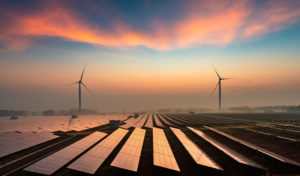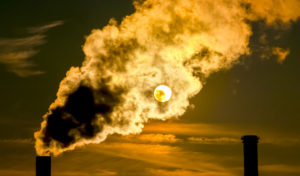
Obama and his Republican rivals seek different paths to energy independence.
As the race for the presidential election heats up, so does the debate over domestic energy policy. Despite polarizing differences between the parties, President Obama and his major Republican rivals, Mitt Romney, Rick Santorum, and Newt Gingrich, all advocate for an increase in the domestic production of fossil fuels. However, Obama and his Republican opponents differ dramatically on greenhouse gas regulation and renewable energy — a point that Obama has not been highlighting, however, in recent public speeches.
Last week, President Obama completed a two-day, four-state trip to promote his All-of-the-Above energy strategy. The president introduced his proposed approach in a speech earlier this month. The plan has four main components: open new areas for oil and gas exploration, develop natural gas, increase renewable energy sources, and build more fuel-efficient cars and trucks.
Obama’s emphasis on energy policy comes in the wake of increasing gas prices that have become a major focus of political debate. In his speech, Obama addressed criticism that he has limited domestic fossil fuel production, responding that millions of acres have been opened up for oil and gas exploration under his administration and more than 400 drilling permits have been approved.
Obama’s Republican rivals have nevertheless continued to levy criticism and offer alternative approaches. Romney recently called on the President to fire his “gas hike trio,” referring to his top energy advisors. Additionally, Newt Gingrich announced his “2.50 Plan” earlier this month, which he argues would lower the price of gas to $2.50 per gallon through increased domestic energy production.
The fate of Keystone XL pipeline also figures prominently on the presidential campaign trail. In January, Obama denied TransCanada’s application for a permit to build the entire pipeline, postponing a final decision until 2013 after additional environmental review. In contrast, Romney, Gingrich, and Santorum have enthusiastically favored constructing the pipeline. Last week, President Obama announced his plan to open a portion of the Keystone XL pipeline through Oklahoma as soon as possible.
Obama and his rivals differ markedly in their views about the nation’s reliance on coal as an energy source. The president has not emphasized coal in his speeches, and his EPA has strengthened regulations on coal-fired power plants during. By contrast, Romney’s energy policy, outlined in his 59-point plan, strongly supports coal production.
When it comes to hydraulic fracturing, a new method used to extract natural gas that typically is referred to as “fracking,” Romney favors its increased use even in the face of concerns about its environmental effects. Romney only calls for fracking regulation that is not “overly aggressive.” Santorum supports fracking, arguing that critics are trying to turn the technique into “the new boogey man.” More quietly, Obama advocates the “safe” use of different technologies for natural gas production.
In contrast with the Republican candidates, Obama supports reducing greenhouse gas emissions through government initiatives promoting clean energy technologies. Obama’s strategy includes developing renewable energy sources such as wind, solar, hydropower, and biofuels.
In a recent speech, Obama announced a new program to encourage cities, businesses, and citizens to shift to more fuel-efficient cars. He also called on Congress to stop subsidizing oil and gas companies.
The Administration’s 2013 proposed budget, the president requested 2.3 billion dollars for renewable energy and energy efficiency development. By contrast, Romney and Santorum say they would limit greenhouse gas regulation and invest no money in renewable energy development. Romney favors funding more basic research that could yield innovations in clean energy technologies.
It would appear that no matter who wins the next election, the President who inhabits the White House in 2013 will seek to increase domestic production of oil, natural gas, and perhaps nuclear energy. How exactly such energy independence will be pursued, however, will depend on who wins in November.



